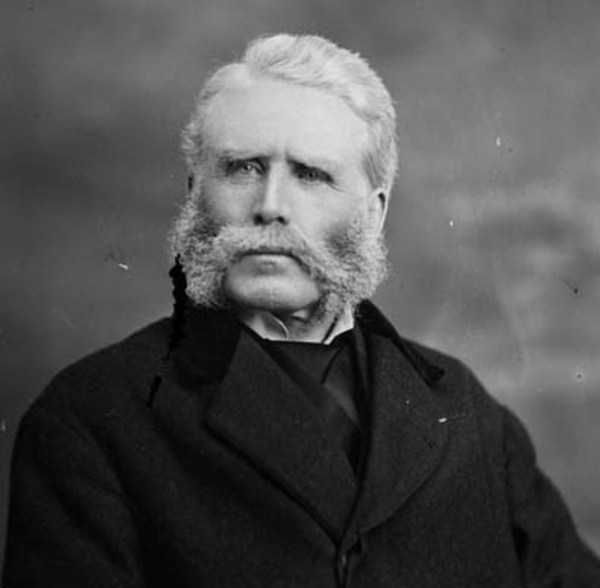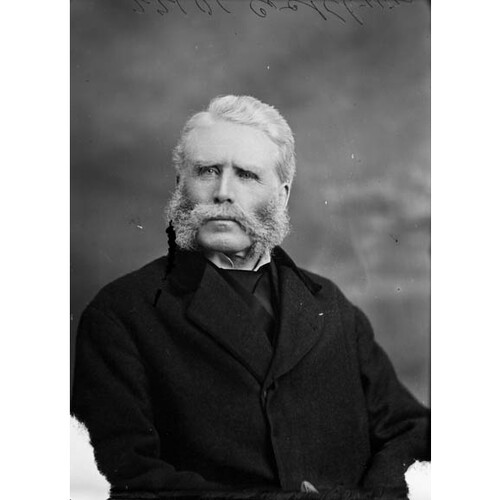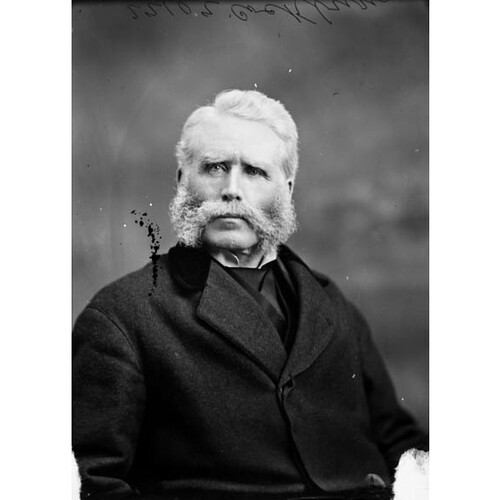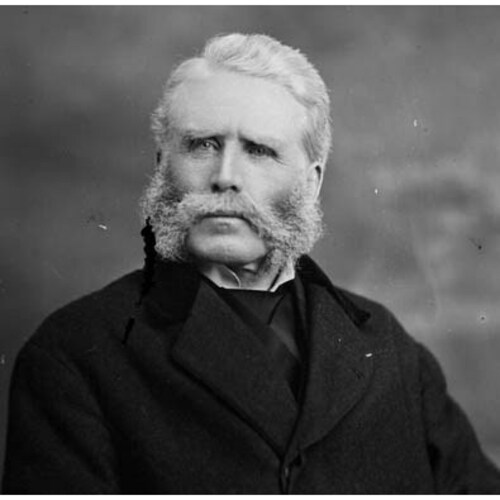
Source: Courtesy of Wikimedia Commons
BORRON, EDWARD BARNES, mine manager, explorer, civil servant, politician, and magistrate; b. 6 Dec. 1820 in Woolden Hall, near Warrington (Cheshire), England, sixth son of John Arthur Borron and Mary Geddes; m. 1854 Marie-Edesse Février, dit Laramée, in Bruce Mines, Upper Canada, and they had four daughters and a son; d. 23 April 1915 in Toronto.
Educated at academies in Lancashire and Newcastle upon Tyne, Edward Barnes Borron briefly attended the University of Edinburgh before going to work in his father’s mines in Lanarkshire, Scotland. In 1842 he became general manager of the mine there at Leadhills, a position he relinquished eight years later to emigrate to the Canadas.
Borron’s experience drew him to mining fields in Michigan and in northern Upper Canada, where the Montreal Mining Company operated a copper mine at Bruce Mines, east of Sault Ste Marie. Technical difficulty and misfortune resulted in the dismissal of its management in 1851 and the following year Borron was appointed general manager. Through his efforts the mine became for a short time a profitable proposition. In addition to changing the method of paying miners from a system based on the quantity of rock raised to one dependent on quality, he built a new concentrating works. He planned, moreover, to replace the old smelter with a German-type blast-furnace. By 1852, however, copper prices were falling and the mine began losing its workforce and suffering losses. Borron again revived the operation, but diminishing copper, the loss of the company’s steamer, and other factors, including family responsibilities in Britain, led to his return to Scotland in 1858 as general manager of the Leadhills mine.
By 1862 it had been sold and Borron was back in the Canadas. He spent the next few years exploring along the north shore of Lake Huron, working out of Sault Ste Marie. In 1865 he patented a mineral location near the Mississagi River, but no mining occurred. Four years later the Ontario government appointed him crown lands agent and mining inspector for the Lake Superior division, a position he held until 1873.
Borron’s years as an inspector proved frustrating. Despite a flurry of activity at Silver Islet, “only some fifty or sixty mining claims were issued . . . ,” he recalled, “and very few mining claims were registered.” Still, these years served as a foundation for his next career, that of a Liberal mp. In 1874 he successfully contested the general election in Algoma, which encompassed much of northern Ontario. A loyal if not a particularly vocal member of the government of Alexander Mackenzie*, he spoke occasionally on issues of relevance to Algoma, for example the proposed transcontinental railway and the need for a developmental infrastructure, such as locks at Fort Frances. Setting him apart from many contemporaries was his liberal concern for the native peoples in the region, especially their rights to annuities guaranteed by the Robinson treaties of 1850 [see William Benjamin Robinson*], the only subject he addressed more than once.
By early 1877 Borron wanted to resign from the House of Commons in exchange for a patronage appointment. He was discouraged from doing so by Mackenzie, who was concerned about his weakening majority. Borron did not run in 1878, but in May 1879 his Liberal connections paid dividends at the provincial level.
In 1878, during the federal-provincial dispute over the northern boundaries of Ontario, a board of arbitration had awarded the province the territory between Hudson Bay and the Great Lakes drainage basin and west to Lake of the Woods [see Simon James Dawson*]. Acting on this award the following year, in an attempt to establish de facto authority, the government of Oliver Mowat* divided the new territory along the 87th parallel of longitude to form two judicial districts, and appointed a stipendiary magistrate for each: William Durie Lyon for Thunder Bay and Borron for northern Nipissing. Borron would prove to be a most effective crusader for Ontario’s cause against continuing federal designs on the region.
Nipissing was an enormous region, and on Borron’s recommendation the province made Hudson’s Bay Company officers at Moose Factory and Fort Albany justices of the peace in 1883, thus bringing the James Bay region functionally into Ontario’s judicial system. The administration of justice, however, required little of Borron’s attention, a fact that would lead in 1887 to a fruitless Conservative attack on his appointment. Generally his energies were directed towards another part of his mandate: “to procure and forward information, and to advise and assist in settling all matters relating to our new territory.”
Borron’s work consisted in practice of annual inspection tours. In 1879, at age 59, he had embarked on the first of eight summer expeditions, during which he traversed Nipissing, much of the time by canoe. Although he did not display the promotional verve of such northern advocates as Daniel Francis Burk and James Conmee, his detailed reports provided Mowat and the provincial parliament with a wealth of information about the geography, inhabitants, resources, and economic potential of northeastern Ontario. Borron, for instance, was one of the first to proclaim the supposed agricultural promise of the Great Clay Belt, and his admonitions about the wise use of the province’s natural resources demonstrated an environmental and conservational awareness uncharacteristic of his era.
After 1886 Borron curtailed his travels, but he continued to file annual reports, except in 1889, when he testified at length before the royal commission on mineral resources, an equally informative exercise. His last major study, submitted in 1891, was a farsighted review of Ontario’s waterways and hydroelectric potential. Borron’s concluding recommendation, that waterpower be reserved to the crown, presaged legislative and regulatory action by the government of Arthur Sturgis Hardy* in 1897–98. Borron remained on the provincial payroll until 1902, or possibly 1904, when, at the grand age of 83, he enquired about joining the federal civil service. Failing in this endeavour, he retired in Toronto, where he lived with his wife until his death in 1915.
E. B. Borron was a remarkable individual whose career, in the estimate of biographer Morris Zaslow, was “very significant in terms of the history of Ontario. He informed and advised the provincial government on appropriate policies for northern development at a time when the region had little or no political power and needed to have its interests represented on the highest level of policy determination.”
The authoritative examination of Borron’s career is Morris Zaslow, “Edward Barnes Borron, 1820–1915: northern pioneer and public servant extraordinary,” in Aspects of nineteenth-century Ontario . . . , ed. F. H. Armstrong et al. (Toronto and Buffalo, N.Y., 1974), 297–311.
ANQ-M, CE3-5, 27 déc. 1834. AO, RG 22-305, no.31537; RG 80-2-0-32, nos.28532–33; RG 80-2-0-33, nos.1023–24. Mount Pleasant Cemetery (Toronto), Burial records and tombstones, plot D, sect. 17, lot 7. NA, RG 31, C1, 1871, Algoma West, Ont., Kaministiquia: 20–21 (mfm. at AO). Globe, 24 April 1915. Sault Daily Star (Sault Ste Marie, Ont.), 4 May 1915. Can., House of Commons, Debates, 1875, 1: 678, 1026–27; 1877, 3: 186, 194, 969–71, 1075; 1878, 2: 2509. CPG, 1876. Dianne Newell, Technology on the frontier: mining in old Ontario (Vancouver, 1986). Ont., Legislature, Sessional papers, 1880, no.22; 1881, no.44; 1882, no.53; 1882–83, no.39; 1885, no.1; 1886, no.1; 1887, no.64; 1888, no.1; 1890, no.87; 1892, no.3; Royal commission on the mineral resources of Ontario and measures for their development, Report (Toronto, 1890), 92–100, 316–17, 402–4; Statutes, 1879, c.19.
Cite This Article
R. Matthew Bray, “BORRON, EDWARD BARNES,” in Dictionary of Canadian Biography, vol. 14, University of Toronto/Université Laval, 2003–, accessed April 27, 2025, https://www.biographi.ca/en/bio/borron_edward_barnes_14E.html.
The citation above shows the format for footnotes and endnotes according to the Chicago manual of style (16th edition). Information to be used in other citation formats:
| Permalink: | https://www.biographi.ca/en/bio/borron_edward_barnes_14E.html |
| Author of Article: | R. Matthew Bray |
| Title of Article: | BORRON, EDWARD BARNES |
| Publication Name: | Dictionary of Canadian Biography, vol. 14 |
| Publisher: | University of Toronto/Université Laval |
| Year of revision: | 1998 |
| Access Date: | April 27, 2025 |





